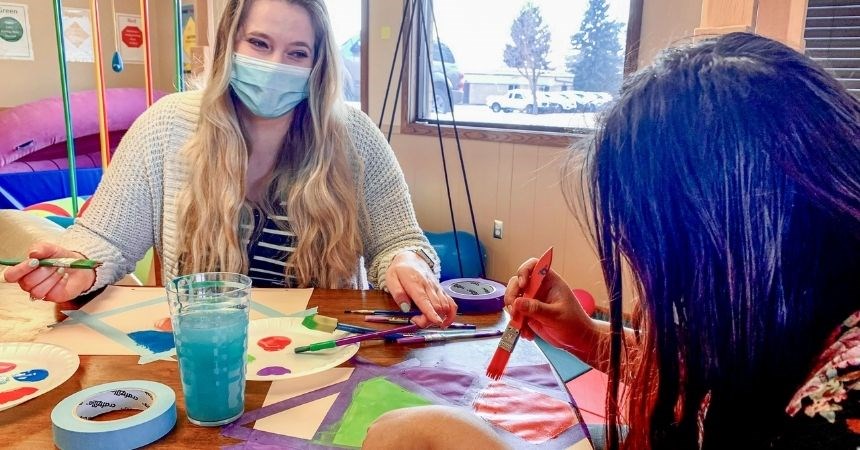Oftentimes, when Ranch friends tour one of our campuses, they are surprised to see the significant role Occupational Therapists (OTs) play on the treatment team.
If we go back to its roots, the Occupational Therapy field originated with the 1963 Mental Health Act, which deinstitutionalized people with mental health issues. In the beginning, OTs helped people with mental health issues develop skills and coping mechanisms so they could live independently in the community, go to school, work, and live meaningful, productive lives.
Over time, their role expanded to working in physical rehab facilities to help people recover from brain injuries and strokes; and pediatric settings to help children meet developmental milestones. But, according to the American Occupational Therapy Association (AOTA), it is again becoming more common for OTs to work in mental health settings.
This is certainly true at Dakota Boys and Girls Ranch, where OTs and Certified Occupational Therapy Assistants (COTAs) play an integral role in the care and treatment of the children in our care.
Renae Fettig, Occupational Therapy Supervisor at the Ranch, said the role of OT in mental health is becoming more prevalent because of our growing knowledge and experience with sensory processing and brain development.
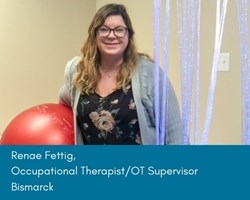 "We have primary senses and secondary senses," Renae said. "Our primary senses develop while we are in-utero and our secondary senses develop throughout our childhood. Mental health issues and trauma impact that development. For example, if a child is neglected or not nurtured appropriately while their primary and secondary senses are developing, they may have delays."
"We have primary senses and secondary senses," Renae said. "Our primary senses develop while we are in-utero and our secondary senses develop throughout our childhood. Mental health issues and trauma impact that development. For example, if a child is neglected or not nurtured appropriately while their primary and secondary senses are developing, they may have delays."
"We need our sense of touch, vision, and sound to build spatial and body awareness—to know where our hands and feet are in space. This impacts our balance and movement, and ultimately our posture and eye-hand coordination. You need these skills to build handwriting and self-care skills. As we develop our senses, they all build upon one another so we can be successful. As OTs, we use a bottom-up approach—helping them feel safe and secure in their environment so they can develop those skills," Renae said.
Dr. Tammy Uleberg, Nurse Practitioner at the Ranch, said, "A lot of our kids have sensory or emotional regulation issues, and are behind in fine motor skills. An OT evaluates every one of our residents and they are an important part of the team. They look at balance, coordination, fine motor skills, emotional regulation. It is great to have the OTs on our team."
The ultimate focus of OT is to assist clients in participating in daily activities as independently as possible. At the Ranch, this means helping kids learn how to play, practice hygiene, interact with their peers, find success in school, adjust their environment to improve attention, and manage their behaviors. For older Ranch residents, OTs may focus on building independent living skills like making meal plans, shopping, cooking, finding a job, managing money, and building a healthy support system.
What led you to a career in Occupational Therapy?
Renae Fettig: I knew I wanted to help people and I wanted to go into healthcare, but I didn't know Occupational Therapy was an option until my school counselor suggested it after going over my interests and ideas. It wasn't until I was at the OT program at the University of Mary that I knew this was exactly what I wanted to do with my life. I could have used OT services myself as a child—I have sensitivities to touch and sound, and had to learn to cope with those on my own. I am glad I can help kids recognize those and learn how to cope with them.
Lindsey Lorenz: In my high school health careers class, we were able to job shadow different health careers. I chose to shadow an Occupational Therapist and I loved everything about it. But then instead of pursuing OT, I went to North Dakota State University for natural resource management. I was in the program for a year and decided it was not the place for me, so I transferred to North Dakota State College of Science to pursue a career as an occupational therapy assistant.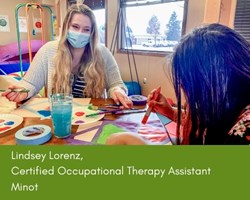
Kassandra Engeberg: While getting my undergrad degree in psychology, I worked as a therapy aide at the hospital in Grand Forks, ND. I worked in rehab, the hospital, outpatient pediatrics, NICU, and the psychiatric unit. I really liked working with the kids. The Occupational Therapists were so creative, and I just loved it.
Nikki McCarl: I took general courses in college but didn't have a really strong drive for any particular career. I took a few years off from college, and with a little push from my parents, started thinking about what I wanted to do. I'd worked in group homes and wanted to continue down that path because I like the one-on-one contact with people, helping them deal with their struggles. OT has such a wide variety of fields you can work in, so I went to North Dakota State College of Science and earned my certificate.
Jordan Mooney: I just really wanted to be in a profession where I impacted the quality of someone's life in a practical way. OT is really personal and practical. I love being in a profession where I can positively impact the trajectory of a person's life through the activities they complete every day. Here at the Ranch, we come alongside kids and their families and develop personalized strategies for their successful engagement in everyday life.
Rachel Hofmann: When I was in high school, I came across this website that showed you the college classes you had to take, the description of the classes, and the jobs you could do with each. I read about Occupational Therapy and it seemed like there was a lot of variety and hands-on work. I'd never really cared for school and book reading, so the hands-on work really intrigued me. I shadowed an OT at the hospital and remember one of the interventions they did with an older man. Fishing was one of his hobbies, so they played Wii fishing with him—it was just something to get him out of bed and active. I like that OT is an occupation where you're helping someone want to do things that bring them joy.
Why do you choose to work at the Ranch?
Renae: The Ranch is ahead of the curve in recognizing the importance of Occupational Therapy—both for sensory issues and mental health. I feel appreciated and like an important part of the team of professionals helping the children. I’m passionate about working with kids because of my personal experience. I had great parents who were supportive of my needs, but I had to learn the coping skills on my own so I could pass my classes and make it through high school and college.
Lindsey: This type of setting wasn’t on my radar at first. Before the Ranch, I mostly worked in geriatrics, but I had done some mental health fieldwork during college. So, when I saw the opening I decided to apply. It was a big switch from geriatrics to pediatrics, but I love it. In other settings, you get stuck in a routine of doing the same thing day after day, but with our kids, you get to try new interventions every day. I like that I can be creative.
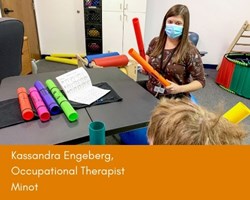 Kassandra: To be completely honest, a boy wouldn’t move his farmland, so I had to find a job in Minot! But seriously, why wouldn’t I want to work at the Ranch? It is a great place to work and I get to work with great kids who need help and are willing to work. They are so excited when they realize they’ve reached their goals.
Kassandra: To be completely honest, a boy wouldn’t move his farmland, so I had to find a job in Minot! But seriously, why wouldn’t I want to work at the Ranch? It is a great place to work and I get to work with great kids who need help and are willing to work. They are so excited when they realize they’ve reached their goals.
Nikki: I’ve come full circle. High school was a horrible time in my life, and I was in a treatment center myself. I’m constantly learning from the kids and my coworkers. I love working in the mental health field and getting to the nitty-gritty of it all. In a lot of careers, you don’t get to see the true person. I love having serious conversations and getting to the meat of a person. I love collaborating with a team to help our kids. Working here has really allowed me to embrace just being human.
Jordan: I choose to work here because I believe recovery is possible for kids and families. It’s not always easy, but I think each child is worth the effort. I think we are accomplishing God’s work here at the Ranch. There is a lot of brokenness in the world and God is in the business of redemption. I want to be part of bringing hope to dark places.
Rachel: Obviously, the kids. They need people to teach them and be there for them. It can be really challenging with this population of adolescents with mental health issues. You can’t always tell if you’re making a difference and I forget sometimes that it takes time for the work we are doing to make an impact. But then you have that one good moment with a kid, and it reminds you that this is why you are here. During one of our sessions, a 13-year-old boy was playing on the hammock swing. Normally you just sit on it and bounce, but he was jumping on it and exerting so much energy and really playing. He was saying, “This is so much fun. When can I come back?” It was so fun to give him the freedom to explore, and then sit back and watch him learn how to play.
What has surprised you?
Renae: I’m surprised by the resilience and dedication of our kids. They’re dealt poor hands, but they do the best they can. It amazes me how much they want to succeed and what they can do with the hand they are dealt.
Lindsey: The kids surprise me every day. They are all so unique and diverse.
Kassandra: That the kids are just regular kids. They aren’t out to get you. They are just like every other kid. They want to be loved. They want to succeed. They want to do well. The Ranch is a great place for them to succeed and learn how to contribute to society.
Nikki: I’m most surprised how much I love working with kids. It was initially very intimidating for me. I took a leap of faith and got a job working at a Detroit Lakes elementary school where, at first, I felt like a fish out of water. Then I came to the Ranch and thought the kids were going to eat me alive, but I’ve found that’s very much not the case. I’m surprised by how much our kids want to change—they just don’t believe they can. They are so appreciative of a little bit of nurturing.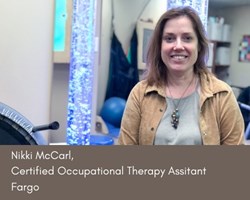
Jordan: I’ve been surprised by the variety of the work I do. As an OT, it’s a dream to not be fully niched into one place. I get to work with kids on everything from hygiene and emotional regulation to horse therapy and community engagement. I get to work with a wonderful team that really advocates for these kids and wants the best for them.
Rachel: What surprises me about the kids is when they can really step out of their treatment and focus on the other kids. We always say, “Focus on yourself. This is your treatment,” but I appreciate the moments they step outside of themselves to help one of their peers. Just the other day one of the girls was talking to a boy who didn’t want to do his math. She was just very sweet about it. “It’s important,” she told him. “I don’t like math either, but you’ve got to do it.” Encouragement and advice can be so meaningful coming from one of your peers.
What personal attribute makes you well suited to this work?
Renae: I’m a caring person, and I understand where the kids are coming from because of my personal experience.
Lindsey: The things that help me the most are good communication skills and being a team player. I really like working with the different departments to figure out what is best for a child. I think it also helps that I have some of that child-like play and interact well with the kids.
Kassandra: I am a consistent person who is very patient (you cannot rush great things) and understanding. It’s important to take the extra time to understand each kid has unique needs. I have a positive outlook on life and always try to have a smile on my face.
Nikki: I like to collaborate. We have our own personal and professional experiences, and all see things a different way. It’s very helpful to hear other people’s opinions and I like looking at things from different perspectives. I think my having gone through a lot of what our kids have gone through is helpful too.
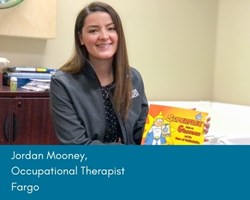 Jordan: I love to learn so I do a lot of research to find the best interventions for each child. My love of people is the passion that fuels me. And my faith. I believe that every person matters.
Jordan: I love to learn so I do a lot of research to find the best interventions for each child. My love of people is the passion that fuels me. And my faith. I believe that every person matters.
Rachel: I’m caring and attentive and organized. I like to be structured and that’s what a lot of our kids need.
What is an example of the type of work you do?
Renae: I recall one girl who had lots of meltdowns and really struggled. It was the sensory piece that helped. We were able to establish some sensory strategies that not only helped her cope, but built confidence and skills. She loved to sweep the gym floor and rollerblade. She needed that extra proprio input to burn off her energy. She was able to make some friends, and the staff immediately saw changes in her. My evaluations often point out sensory, social skills, and coordination difficulties—so we work on all of those. But ultimately, we help kids find and understand their strengths so they can overcome the obstacles in their lives. They are all just so resilient and so strong.
Lindsey: I was working on independent living skills with one of my girls. We were going to do some cooking the next week, so we spent our session planning and problem-solving. A simple cooking exercise can include working on many different executive functioning skills. Can you organize and make a list? Does it fit in your budget? We were able to accomplish a lot with what may seem like a small, very normal task. Right now, I’m working with some older girls on how to hold a conversation; including starting and ending conversations and appropriate questions to ask in a conversation. This is another example of something that comes naturally to us, but it doesn’t always come naturally for our kids. We give them a safe place to practice the skills they’ll need in life.
Kassandra: Recently, I’ve been working with several kids on finding their internal rhythm and timing. What is your pace when you walk across the room? I have the metronome going and ask them to speed up and then slow down, noticing the difference in the rhythm and timing and how it feels in their body. I know it sounds silly, but finding your own rhythm can be tricky. And then we find songs they like that match their rhythm and beat so they can use music as a coping strategy—to bring themselves back to their body. When you are aware of your body, you have more control. If you can’t label the feeling in your body when something happens, how do you deal with it? You and I have coping skills we use all day long without even thinking about it.
One activity I’ve been doing is to set up some orange cones and have the kids walk in an infinity loop. Then I put a target on the wall and they have to move around the cones while looking at the target. The first time I tried it I was knocking over cones like crazy! I record them and when we watch it back, we can see that maybe they knocked cones over five times on their left side, so maybe the left side of their body has a little less awareness than the right. It’s just good practice for walking through the world.
Nikki: We talk with kids, especially the older kids, about thinking errors. We get stuck in thinking patterns and how we interpret a situation greatly impacts how we respond and treat others. I talk with kids about situations they’ve been in, how they felt, and how their response impacted others. A lot of our kids live in survival mode, so they haven’t thought about how what they do impacts other people. I also let kids find ways to calm themselves and put their minds at ease. Sometimes kids will sit on a ball and bounce, and it’s amazing how it can increase their focus. One of my girls was lying on her stomach, pushing back and forth on a ball, and all of a sudden, she really opened up and started talking. Her demeanor completely changed. It’s funny how you can bend over backward trying to do certain things, and then all of a sudden, they discover it on their own. I give them the freedom and encouragement to explore.
Jordan: I worked with one child who has severe anxiety and was having frequent meltdowns, especially in the morning. We structured her morning routine and broke activities into chunks so she could focus on one thing at a time. She has this irrational thought that she doesn’t have enough time. So, we also came up with some messages that countered her irrational thoughts. The three she identified were, “I have enough time,” “I can do one thing at a time,” and “I can ask for help if I need it.” She asked me to put it on every page of her schedule. That was just one strategy where she could have a visual checklist to go through to ground herself.
What makes OTs unique to other professions is that we analyze activity. We ask ourselves, “What are the barriers to this person’s everyday function in that activity? Is it cognitive? Is it functional? Does it have to do with access?” We partner the strengths and limitations of the client with the environment they’re a part of to figure out the best way for them to focus their energy. Ultimately, we want to get to behavioral intelligence, but if a child doesn’t feel safe in their normal living environment, how can they attain such a high-level important skill as managing their behaviors? We help them master the small foundational things to create that level of safety and mastery. Self-confidence in their ability to do the small things frees them up to explore more complex tasks.
Rachel: “One thing that is really fun about my job is helping expose our kids to normalcy, whether it’s getting a job, getting a haircut, taking them shopping, cooking food, or going for a walk.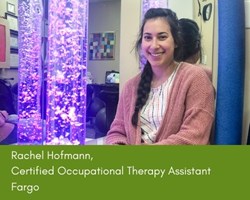
Some of those things can be expensive or time-consuming; and their parents are trying to balance so many other things. We can show them what the world has to offer—that life is not just going to school, coming home, and doing chores. It gives them ideas for things they can do that are fun, safe, and healthy.
Before I came to Fargo, I worked at the Ranch in Minot. We had one boy in Cornelsen cottage who was older than the rest of the boys, but functionally a little bit younger. He needed some independence and space, so we got him a job at the horse barn. I’ve never seen someone more happy to shovel horse poop and clean out the barn. He willingly went to work and worked hard. It brought him a lot of pride.
Another piece of healing
Jim Vetter, Vice President of Treatment Services and Government Relations at the Ranch, believes Occupational Therapy is a vital part of treatment. “We can’t change the world for our kids so they never get bad news or so nothing ever happens that will frustrate them,” Jim said. “But our OT staff can help teach them the skills they need to tolerate the inevitable setbacks and suffering of life.”
This article was originally published in Ranch Voice: Spring 2021.
Read more inspiring stories like this and explore other issues of Ranch Voice.

